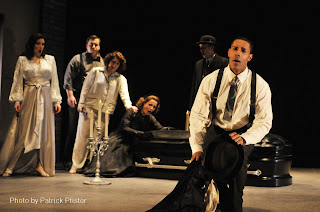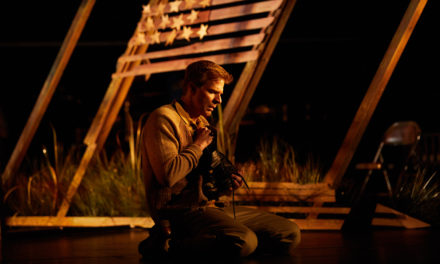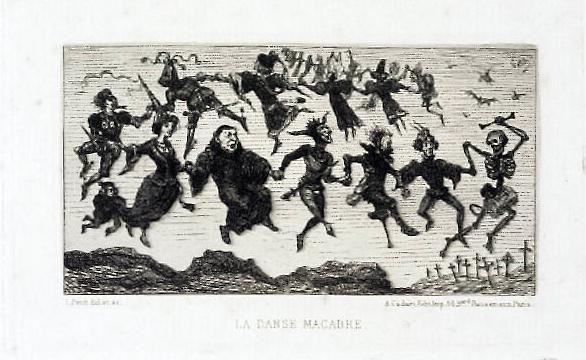 |
| Donovan Singletary as Leporello. Photo by Patrick Pfister. |
Don Giovanni
By Wolfgang Amadeus Mozart and librettist Lorenzo da Ponte.
Directed by Kristine McIntyre
Conducted by Joseph Mechavich
Reviewed by Keith Waits
Entire contents are copyright © 2013 Keith Waits. All rights reserved.
A lone figure slouches against the corner of a building, lit only by a single gas lamp from above. The image is distinctly noir, but when the figure starts to sing, another iconic cultural memory springs to mind: the cliché of Sinatra singing “One for My Baby” from the seminal 1950s’ album Only for the Lonely. Much has been made of the concept of designing this production of Don Giovanni as a film noir, the post World War II style of dark, shadowy crime dramas with an existential bent that was one of the most important and influential trends in American film. Yet the noir tropes shift somewhat, as if their roots are not firm enough, so that the production sometimes makes other cinematic associations. That’s not necessarily a bad thing, but the film noir connection is not as bedrock to this inspired design work as one might expect.
The limited, analogous palette of black and grays lit with yellow, diffused light cannot help but bring to mind the deep brown shadows of The Godfather; and, of course, the libretto in Italian doesn’t hurt. The cumulative effect of all of the design work firmly establishes a 1940s’ setting. But it could be Italy as easily as America, and some of the scale and textures are evocative of another important film movement: Italian Neo-Realists, a school born during the tumult of Mussolini and the iron grip of fascism in Europe. It is arguably as potent a connection as the noir aspect, and the difference often comes down to details such as whether the hat brims are turned up or down. The outstanding costumes (by Holly Jenkins-Evans) are suitably stylish, but nowhere is there anything like the noir figure cut by Robert Mitchum, who is spotlighted in the fulsome background material included in the program.
Still, some of the casting calls to mind film noir mainstays: Ben Wager’s Don Giovanni has the slick, oily presence of Joseph Calleia in The Glass Key, while Deborah Selig cuts an Ava Gardner-like figure (The Killers) when she makes her entrance as Donna Elvira in a stunning white period suit. Yet for the most part the performers make an impact based on their merits as singers rather than any resemblance to Hollywood stars from a by-gone era. Donovan Singletary was the highlight of the evening as Leporello, Don Giovanni’s aide, in a well-measured comic performance that easily ingratiated the character to the audience. Katy Lindhart was another standout as Zerlina, delivering great sass and wit to the main love story with Masetto, played by an able Noel Boulley.
Donna Anna and Don Ottavio are somewhat less showy roles than the other main characters, but Taylor Stayton and Jan Cornelius sing them with great warmth. Mr. Cornelius’s reading of “Non mi dir” late in the evening was particularly tender and subtle in its colors. Liam Moran is suitably grave and sepulchral as the Commendatore, even if the staging somewhat limits the impact of his big moment near the end.
This is an effective rendering of one of Mozart’s most famous operas – a funny, bawdy story for an opera classified as a tragedy. The action is framed with two deaths, to be sure; but the narrative is an opportunity for marvelous character playing and physical comedy, which is why Mr. Singletary and Ms. Lindhart stand out. Almost every major character earns sure laughs. But when Leporello is masquerading as Don Giovanni, the actor playing him manages some sly and fluid movement that harkens back to one more film style: silent-film comedy.
Conductor Joseph Mechavich leads the Louisville Orchestra in a sterling performance of the Mozart score, filled with familiar songs and motifs. He himself also delivers a light but colorful touch on the passages featuring the harpsichord, and at one point Don Giovanni plays the mandolin for a brief passage, with Mr. Wager proving an adept musician.
In the end, the overemphasis on a concept that is never quite nailed down doesn’t hold back this richly realized production. The revised setting may slightly undercut some of the more legendary aspects of Don Giovanni. But it will please aficionados with the emotions and grandeur that are requisite to this tale, while perhaps creating a more accessible gateway for anyone who has previously found opera a formidable proposition.
Don Giovanni
Friday, February 15, 2014, at 8 p.m.
Sunday, February 17, 2014, at 2 p.m.
Kentucky Opera
W. L. Lyons Brown Theatre
315 West Broadway
Louisville, KY 40202
502-584-7777



